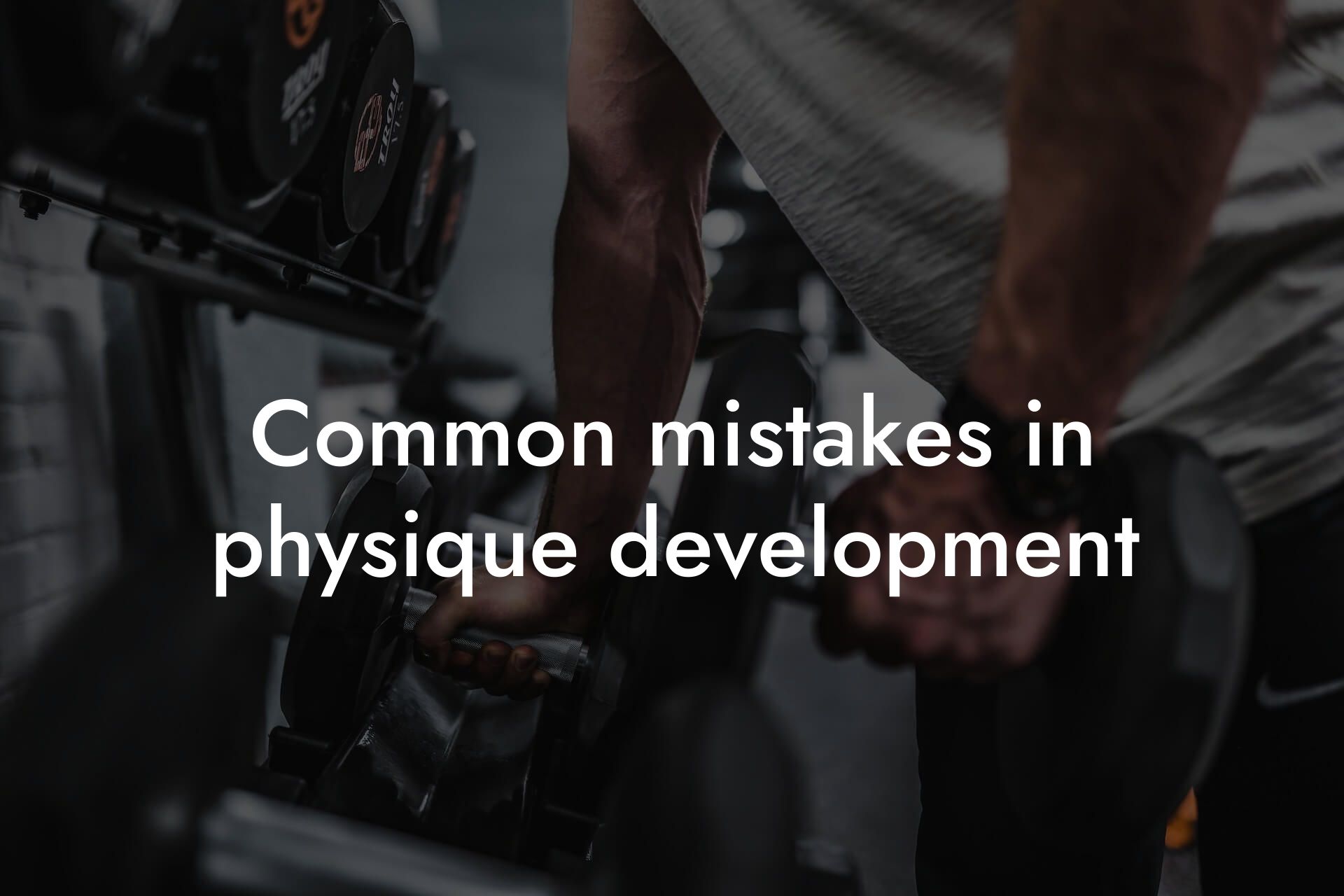When it comes to physique development, many factors come into play, including diet, exercise, and lifestyle habits. However, there is another crucial element that plays a significant role in shaping our physical appearance: genetics. As high-earning professionals interested in optimizing their physical appearance, it's essential to understand the impact of genetics on physique development. In this article, we'll delve into the world of genetics and explore how it influences our body shape, size, and composition.
Table of Contents
- What is the Genetic Contribution to Physique Development?
- How Do Genetics Affect Body Shape and Proportions?
- The Role of Genetics in Muscle Development and Strength
- Genetics and Body Fat Distribution
- The Impact of Genetics on Bone Density and Structure
- Can You Overcome Genetic Limitations?
- How Can DEXA Scanning Help?
- Frequently Asked Questions
What is the Genetic Contribution to Physique Development?
Research suggests that genetics account for approximately 30-80% of the variation in physique development, with the remaining 20-70% attributed to environmental factors such as diet and exercise. This means that our genetic makeup has a significant influence on our body shape, size, and composition. Genetic factors can affect various aspects of physique development, including:
- Body shape and proportions
- Muscle mass and strength
- Body fat distribution and percentage
- Bone density and structure
- Metabolic rate and efficiency
How Do Genetics Affect Body Shape and Proportions?
Genetics play a significant role in determining our body shape and proportions. For example, some people may be naturally more ectomorphic (lean and slender), while others may be more endomorphic (curvy and round). Genetic factors can influence the distribution of fat and muscle mass, resulting in varying body shapes and proportions. Additionally, genetics can affect the shape and size of our bones, which can further impact our overall physique.
The Role of Genetics in Muscle Development and Strength
Genetics also play a crucial role in muscle development and strength. Research has identified several genetic variants associated with muscle strength and power. For example, some people may have a genetic predisposition to develop more fast-twitch muscle fibers, which are better suited for explosive strength and power. Others may have a genetic tendency to develop more slow-twitch muscle fibers, which are better suited for endurance and stamina.
Genetics and Body Fat Distribution
Genetics can influence body fat distribution, with some people more prone to storing fat in certain areas of the body, such as the hips, thighs, or midsection. This can be due to genetic variations that affect hormone regulation, metabolism, and fat storage. For example, some people may have a genetic tendency to store more visceral fat, which is associated with an increased risk of chronic diseases.
The Impact of Genetics on Bone Density and Structure
Genetics play a significant role in determining bone density and structure. Research has identified several genetic variants associated with osteoporosis, a condition characterized by low bone density and increased fracture risk. Additionally, genetics can influence the shape and size of our bones, which can affect our overall physique and athletic performance.
Can You Overcome Genetic Limitations?
While genetics play a significant role in physique development, it's essential to remember that they are not the only factor. Environmental factors such as diet, exercise, and lifestyle habits can also have a profound impact on our physical appearance. With consistent effort and dedication, it's possible to overcome genetic limitations and achieve your desired physique. For example, a person with a genetic predisposition to obesity can still achieve a healthy weight through a combination of diet and exercise.
How Can DEXA Scanning Help?
At Tano Performance Group, we understand the importance of genetics in physique development. That's why we offer DEXA scanning, a comprehensive body assessment that provides valuable insights into your body composition, bone density, and other key metrics. By understanding your genetic predispositions and environmental factors, our team can help you develop a personalized plan to optimize your physique and achieve your goals.
In conclusion, genetics play a significant role in physique development, influencing body shape, size, and composition. While genetic limitations exist, they can be overcome with consistent effort and dedication. By understanding the role of genetics in physique development and leveraging tools like DEXA scanning, high-earning professionals can take control of their physical appearance and achieve their desired physique. Remember, knowledge is power, and understanding your genetic makeup is the first step towards optimizing your physique and achieving your goals.
Frequently Asked Questions
What role does genetics play in physique development?
Genetics play a significant role in physique development, influencing factors such as body shape, muscle mass, bone density, and body fat distribution. While environmental factors like diet and exercise also contribute to physique development, genetics set the foundation for an individual's physical characteristics.
How much of my physique is determined by genetics?
Research suggests that 30-80% of the variation in physique traits can be attributed to genetic factors. This means that a significant portion of your physique is influenced by your genetic makeup, but there is still room for environmental factors to shape your physical appearance.
Can I change my genetic physique?
While you can't change your genetic code, you can influence how your genes are expressed through lifestyle choices like diet, exercise, and stress management. This means that you can optimize your physique within the boundaries set by your genetics.
What genetic factors influence muscle growth and development?
Genetic factors such as muscle fiber type, muscle protein synthesis, and hormone regulation all play a role in muscle growth and development. Additionally, genetic variations in genes like ACTN3 and MSTN can affect muscle strength and power.
How does body fat distribution relate to genetics?
Genetics influence body fat distribution patterns, with some individuals more prone to storing fat in certain areas like the abdomen or hips. This is due to genetic variations in genes involved in fat metabolism and storage.
Can genetics affect my bone density?
Yes, genetics play a role in determining bone density, with certain genetic variations increasing the risk of osteoporosis and fractures. However, lifestyle factors like exercise and calcium intake can also impact bone density.
How do hormones impact physique development, and is it influenced by genetics?
Hormones like testosterone, growth hormone, and insulin-like growth factor-1 (IGF-1) all play a role in physique development. Genetic variations in hormone regulation can influence hormone levels and activity, which in turn affect physique development.
What is the relationship between genetics and athletic performance?
Genetics can influence athletic performance by affecting factors like muscle strength, power, and endurance. However, training and environmental factors also play a significant role in determining athletic ability.
Can I use genetic testing to optimize my physique?
Genetic testing can provide insights into your genetic predispositions and help you tailor your diet and exercise plan to your individual needs. However, it's essential to consult with a qualified healthcare professional to interpret test results and develop a personalized plan.
How does epigenetics impact physique development?
Epigenetics is the study of gene expression, and it plays a crucial role in physique development. Environmental factors like diet and exercise can influence gene expression, which in turn affects physique development.
What is the role of genetics in body shape and composition?
Genetics influence body shape and composition by affecting factors like muscle mass, body fat distribution, and bone density. This means that your genetic makeup can influence your overall physique and body shape.
Can I overcome genetic limitations with hard work and dedication?
While hard work and dedication are essential for achieving your fitness goals, they cannot completely overcome genetic limitations. However, by understanding your genetic predispositions, you can optimize your training and nutrition plan to maximize your results.
How does genetics impact my response to exercise and training?
Genetics can influence your response to exercise and training by affecting factors like muscle growth, endurance, and recovery. This means that your genetic makeup can impact how your body responds to different types of exercise and training protocols.
What is the relationship between genetics and nutrition?
Genetics can influence your nutritional needs and response to different diets. For example, genetic variations in genes involved in carbohydrate metabolism can affect how your body responds to high-carb diets.
Can genetics affect my risk of injury or illness?
Yes, genetics can influence your risk of injury or illness, particularly in relation to musculoskeletal disorders like osteoarthritis. However, lifestyle factors like exercise and nutrition also play a role in determining your overall health and risk of injury or illness.
How does genetics impact my mental health and motivation?
Genetics can influence mental health and motivation by affecting factors like mood regulation, anxiety, and depression. Additionally, genetic variations in genes involved in dopamine and serotonin regulation can impact motivation and reward processing.
What is the role of genetics in aging and longevity?
Genetics play a significant role in aging and longevity, with certain genetic variations influencing the rate of aging and risk of age-related diseases. However, lifestyle factors like diet, exercise, and stress management also impact aging and longevity.
Can I use genetic information to optimize my workout routine?
Yes, genetic information can be used to optimize your workout routine by identifying your strengths and weaknesses, as well as your response to different types of exercise. This can help you develop a personalized training plan that maximizes your results.
How does genetics impact my body's ability to recover from exercise?
Genetics can influence your body's ability to recover from exercise by affecting factors like muscle damage, inflammation, and repair. This means that your genetic makeup can impact how quickly you recover from intense exercise.
What is the role of genetics in determining my ideal body weight?
Genetics can influence your ideal body weight by affecting factors like body composition, metabolism, and hunger regulation. This means that your genetic makeup can impact your ability to maintain a healthy weight.
Can genetics affect my risk of chronic diseases like diabetes and heart disease?
Yes, genetics can influence your risk of chronic diseases like diabetes and heart disease by affecting factors like insulin sensitivity, lipid metabolism, and blood pressure regulation. However, lifestyle factors like diet and exercise also play a significant role in determining disease risk.
How does genetics impact my sleep quality and duration?
Genetics can influence sleep quality and duration by affecting factors like sleep regulation, circadian rhythms, and sleep disorders. This means that your genetic makeup can impact your ability to get a good night's sleep.
What is the relationship between genetics and stress response?
Genetics can influence stress response by affecting factors like cortisol regulation, anxiety, and mood regulation. This means that your genetic makeup can impact how you respond to stress and how it affects your overall health and wellbeing.
Can genetics affect my ability to build muscle mass?
Yes, genetics can influence your ability to build muscle mass by affecting factors like muscle protein synthesis, muscle fiber type, and hormone regulation. However, consistent training and proper nutrition can still help you build muscle mass, even if you're not genetically predisposed to it.
How does genetics impact my overall health and wellbeing?
Genetics can influence overall health and wellbeing by affecting factors like disease risk, nutritional needs, and response to environmental stressors. This means that your genetic makeup can impact your overall health and wellbeing, but lifestyle factors like diet, exercise, and stress management also play a significant role.
Here are some related articles you might love...
- Aesthetic goals for professionals: Setting realistic expectations
- The impact of sleep on physique and muscle recovery
- Common mistakes in physique development
- Top workouts to enhance your physique
- Building a professional physique: A guide for busy professionals
- Muscle toning vs building: What’s the difference?
- How your physique impacts your confidence and career
- Best supplements for improving physique
- How to maintain a lean physique year-round
Zak Faulkner
Zak Faulkner is a leading authority in the realm of physical health and body composition analysis, with over 15 years of experience helping professionals optimise their fitness and well-being. As one the experts behind Tano Performance Group, Zak has dedicated his career to providing in-depth, science-backed insights that empower clients to elevate their physical performance and overall health.
With extensive knowledge of DEXA technology, Zak specializes in delivering comprehensive body assessments that offer precise data on body fat, muscle mass, bone density, and overall physique. His expertise enables individuals to make informed decisions and achieve their fitness goals with accuracy and confidence. Zak’s approach is rooted in a deep understanding of human physiology, combined with a passion for helping clients unlock their full potential through personalised strategies.
Over the years, Zak has earned a reputation for his commitment to excellence, precision, and client-focused service. His guidance is trusted by top professionals who demand the best when it comes to their health. Whether advising on fitness programs, nutritional strategies, or long-term wellness plans, Zak Faulkner’s insights are a valuable resource for anyone serious about taking their health and fitness to the next level.
At Tano Performance Group, Zak continues to lead our Content Team revolutionising how professionals approach their physical health, offering unparalleled expertise that drives real results.




